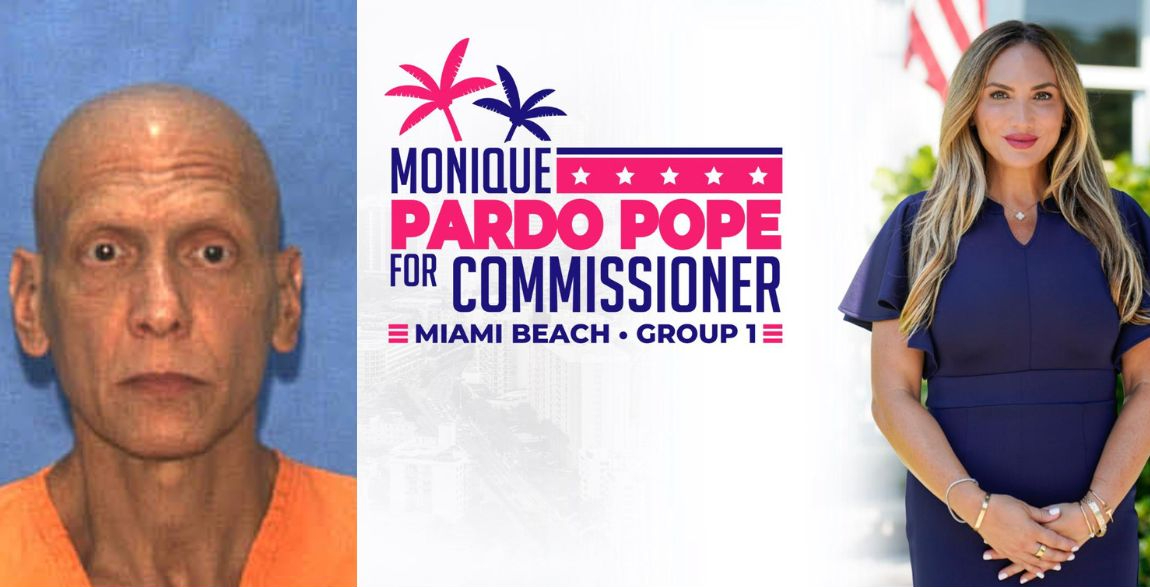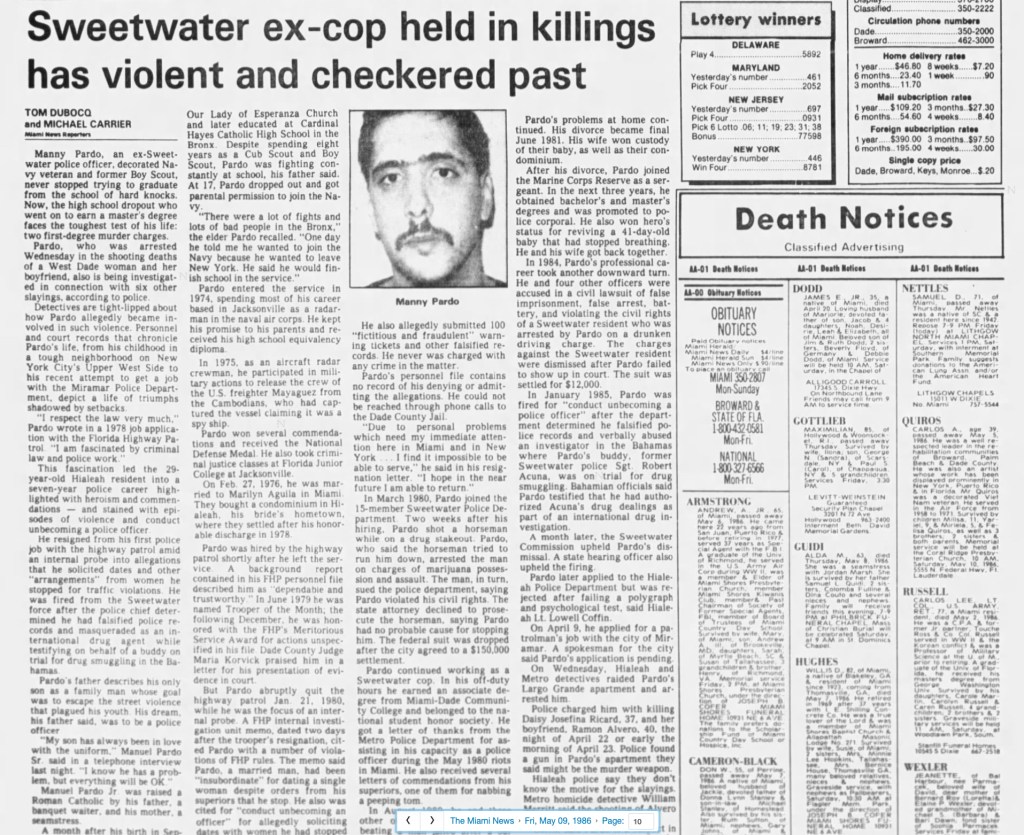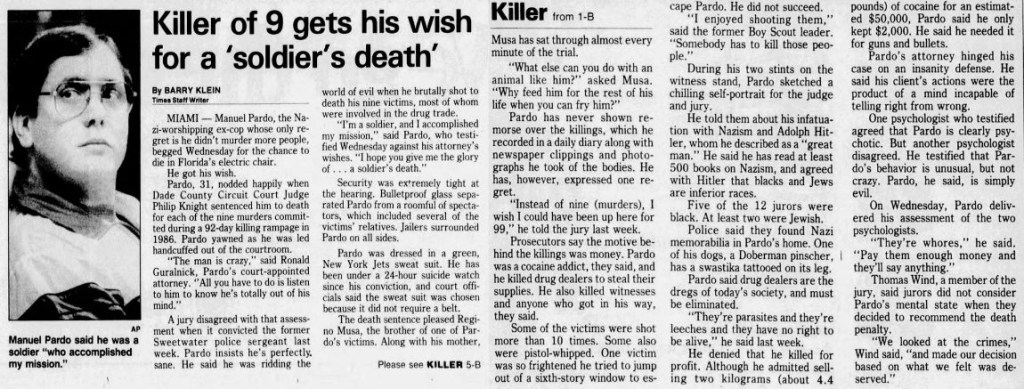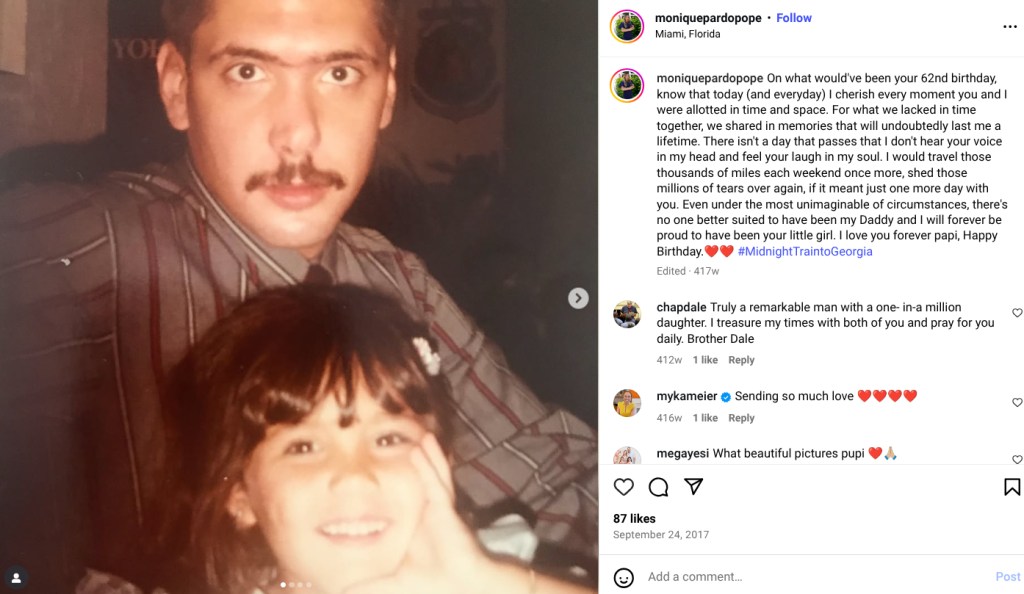
Photos by Florida Department of Corrections, via Facebook/MoniquePardoPope

Audio By Carbonatix
It is not unusual for the children of politicians to enter the political sphere. Look at the Bush family, for instance. President George W. Bush and Jeb Bush followed in the footsteps of their father, President George H.W. Bush.
But how about the daughter of a late Hitler-obsessed serial killer who had a dog with a swastika tattoo?
Monique Pardo Pope, a Hialeah-born lawyer, is running to succeed Kristen Rosen Gonzalez on the City of Miami Beach Commission. Unbeknownst to perhaps most voters, the 44-year-old is the daughter of Manuel Pardo, a former police officer who also happens to have expressed admiration for Adolf Hitler and killed nine people over 92 days between January and April of 1986. (There is even speculation that Pardo’s story inspired the hit TV show Dexter.) Convicted of murder in 1988, Pardo lingered on Death Row until 2012, when then-Gov. Rick Scott signed his death warrant. He was executed in December of that year.
Yet to read Monique Pardo Pope’s social media tributes to her dad over the years, you’d never guess he was a notorious serial killer. “My daddy, my hero…Michi girl loves you eternally. Happy Father’s Day Papi,” she posted on Instagram in 2013.

Screenshot via Instagram/@moniquepardopope
A year later, she celebrated her father and stepfather on Instagram, writing, “To the best daddies I have ever dreamed of — both past & present. Thank you each for representing what a true hero in both life and love should represent to a little girl. My heart is full of love for both my fathers. Happy Father’s Day Manuel Pardo & William Lorenzo. #daddyslittlegirl.”
In September 2016, Pardo Pope wished her late father a happy birthday in a Facebook post.
“Today, you turn the big 60, and surely we would have celebrated over honey buns and apple strudels,” the post reads. “I miss you and an incomprehensible amount, but I find solace in knowing you never truly left. You undoubtedly have remained by my side each step of the way — my hero, my guardian angel, my Daddy eternally.”
Prior to becoming a serial killer who notoriously stashed away newspaper clippings about his murders, Pardo had a bright future in law enforcement, as detailed in news articles from the 1980s. (New Times retrieved previous reporting on Pardo through archived news articles, some of which are included as images in this story.)
Manuel Pardo grew up in New York City, then joined the Navy, receiving honors for good conduct and sharpshooting. Following his honorable discharge in 1978, he settled down in Hialeah with his wife and daughter and joined the Florida Highway Patrol (FHP), where he continued to earn praise; he was named Trooper of the Month in June 1979 and received the Meritorious Service Award in December of the same year.
But in January 1980, he abruptly quit the highway patrol while he was under internal investigation for allegedly submitting 100 “fictitious and fraudulent” warning tickets and other falsified records, according to previous reporting. Pardo was also cited for dating a single woman though he was a married man, and for allegedly soliciting dates with women during traffic stops.
He joined the Sweetwater Police Department in 1980 but was fired five years later, for “conduct unbecoming a police officer.” During the trial of a fellow Sweetwater officer accused of drug smuggling in the Bahamas, Pardo had falsely testified that he had sanctioned the accused officer’s activities as part of an international narcotics investigation.
He attempted to join the Hialeah Police Department following his dismissal but failed the polygraph and psychological tests.

The Miami News digitized news clipping
Pardo started committing drug “rip-offs” and killed his first two known victims, Mario Amador and Roberto Alonso, during a drug robbery in 1986. Later that month, Pardo shot and killed Michael Millot, a Haitian gunsmith and outspoken critic of Haitian dictator Jean-Claude Duvalier. Pardo, who believed that Millot was a federal informant trying to get him arrested, killed Millot in his wife’s Honda, which was reupholstered and cleaned. (Pardo and his wife divorced in June 1981, and she was granted custody of their baby girl.)
In February 1986, Pardo killed a Santería priest and another man during a robbery in West Miami-Dade. Two months later, during an argument over a $50 pawned ring, Pardo killed two others. Previous reporting revealed that Pardo believed one of the men had marked him for death by messaging him with multiple 8s on a pager — a coded reference to the Santeria religion. His final victims were Daisy Ricard and her boyfriend, Roman Alvero Cruz, whom he targeted because Cruz didn’t show up to a drug deal.
When police searched Pardo’s home following his arrest in May 1986, they found news clippings about the murders and a diary in which he detailed the killings. They also discovered his collection of Nazi memorabilia and a swastika tattoo on his dog, a Doberman pinscher. In an episode of Confessions of Crime, a documentary TV series from the 1990s, Ronald Guralnick, Pardo’s defense attorney, said his client didn’t like Jews, the gay community, people who used narcotics, or Black people.
“And he believed that Hitler was correct by killing all of those people that he did in the Holocaust,” Guralnick added.
Although Miami-Dade prosecutors argued that Pardo was motivated by greed and involved in the drug trade, the defendant maintained that he was a vigilante on a mission to rid society of drug dealers. While awaiting trial, Pardo allegedly admitted to a fellow detainee that he committed three additional murders in Homestead. (He was never charged with additional murders.)
“I killed each and every one of these individuals because they were drug dealers. I object to the word ‘killed these people’ because when you say kill, you are denoting a human being, and these to me were not human beings,” he said on the stand in a clip preserved in an archived video from Miami Dade College’s Wolfson Archives. “These were people who lived off the misery of other people. They are parasites and leeches, and they have no right to be alive.”
Rather than deny his crimes, Pardo said he hoped to have killed more.
“The only regret that I have is that instead of nine I wish I could have been up here for 99,” he told the jury. But at least nine is a substantial message.”
At a news conference following his conviction, Pardo said he could have admired leaders like Martin Luther King Jr. and John F. Kennedy instead of Hitler.
“But they were pacifists,” he said. “I’m an activist.”

Digitized Tampa Bay Times newspaper clippings
In another archived video, he told a news reporter that he hoped others would follow in his footsteps.
“As a child, we used to have to say the Pledge of Allegiance in the morning and pray in the classroom. Nowadays, that’s illegal, unconstitutional. But it is legal to allow homosexuals to teach our children and allow communists to teach our children,” he said. “What does that tell you? We are being destroyed internally. I had to send a message, and I just hope some other people carry out my work.”
In the end, he pleaded with jurors for the death sentence.
“What I’m begging you to do is let me have a glorious ending,” he told jurors in a 1988 sentencing, “and not condemn me to a state institution for the rest of my life.”
“I’m not a criminal. I’m a soldier. As a soldier, I ask to be given the death penalty. I accomplished my mission.”
He was sentenced to death. While awaiting execution, he became known as “Death Row Romeo” for running tabloid ads for pen pals and persuading women to send him thousands of dollars. Then-Gov. Rick Scott signed his death warrant in October 2012.
Pardo was put to death by lethal injection on December 11, 2012, for murdering nine people — six men and three women.

Screenshot via Instagram/@moniquepardopope
Prison officials said Pardo’s last words were, “Airborne forever. I love you, Michi baby,” in reference to his daughter. In a statement distributed after his execution, Pardo wrote to Monique, “I will always be a part of you and live in your heart, mind, and soul. May God bless and protect you and everyone affected by this. I am now ready to ride the midnight train to Georgia.”
Pardo Pope routinely referenced his last written and spoken statements in her social media posts, particularly “Midnight Train to Georgia” and “Airborne Forever.”
“Even under the most unimaginable circumstances, there’s no one better suited to have been my Daddy and I will forever be proud to have been your little girl,” she wrote in a September 2017 Instagram post alongside a collection of childhood photos. I love you forever papi, Happy Birthday. ❤️❤️ #MidnightTraintoGeorgia.”

Screenshot via Instagram/@Moniquepardopope
In a press release announcing her candidacy for the Miami Beach commission, Pardo Pope said she was born into a working-class Cuban family with the values of faith, family, and hard work.
“I do not come from money, nor have I built my career in politics — I come from a Cuban family that believed in deep sacrifice, service of others, and standing up for what’s right,” she added. “That’s precisely the kind of leadership I intend to bring to City Hall.”
When reached by New Times for comment about Corben’s video, Pardo Pope sent a written statement.
“My world was turned upside down when I was four years old because of my father’s actions,” she wrote. “What he did was terrible, and I lost my father as a result. Every day, my heart is heavy knowing that my father not only destroyed my life but also caused pain and suffering for so many others. No four-year-old girl should have had to endure this, and my thoughts are with every family affected by these tragedies. By the statistics, I should not be where I am today. But I have overcome immense challenges, stood up to bullies, and refused to let my past define me. I am not my father — I am Monique Pardo Pope.
“I am confident that voters will look past the sins of my father and understand that I too am a victim in this. These attacks on me are appalling and show exactly what’s wrong with politics today. I was four years old. I did not commit a crime. I have carried this burden my entire life, and I will not be shamed or intimidated now. Billy Corben has made a career of slinging mud, which has even resulted in losing a defamation case. The establishment is desperate and scared, throwing anything they can to distract from the real issues. I will not back down. I will continue fighting for honest leadership, a safer Miami Beach, and ensuring our police officers have the mental health resources they need so no family ever has to suffer like mine — or like so many others.”
New Times followed up, asking Pardo Pope whether she felt people might rightly discern a disconnect between what appears to be a tone of admiration for her father in her past social media posts and her current campaign, in which she has not acknowledged his crimes or his notoriety.
“The posts you’re referencing reflect a daughter’s love, but I didn’t get there easily,” she responded. “I went through a long period in my life where I was bitter and angry — angry that the man I loved, my father, could commit such a crime. But I understood that holding onto that anger and bitterness would destroy me; it would make me another statistic. I had to make a decision, between myself and God, to forgive him.
“Even though I forgive him, it doesn’t mean I condone his actions. The forgiveness wasn’t for him — it was for me. I needed to forgive in order to move forward with my life, to build the family I have, and to dedicate myself to a life of service and purpose. My campaign is about who I am today: a mother, an attorney, a small business owner, and someone committed to building a safer, stronger, more compassionate Miami Beach. My father’s actions shaped my childhood, but they do not define who I am or the values I bring to this city.”
When he learned of Pardo Pope’s comments, Billy Corben sent New Times the following statement:
“I stand by my story and note that Mrs. Pardo Pope did not challenge the substance of my reporting. Her assertion that I have ever ‘[lost] a defamation case’ is both false and defamatory. She’ll be hearing from my attorneys.”